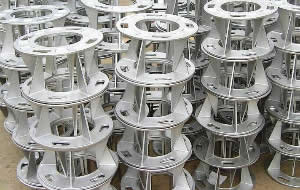Explore the benefits of Aluminum Metal Casting in construction sectors
Wiki Article
Finest Practices for Upkeep and Applications in the Light Weight Aluminum Shop Sector: An In-depth Summary
Keeping devices in the aluminum foundry industry is necessary for functional success. Regular examinations and anticipating maintenance can significantly lower downtime and enhance safety and security. Advanced innovations, such as IoT and information analytics, play a crucial duty in this process. Comprehending the complete range of ideal methods requires a more detailed examination of certain techniques and their influences on effectiveness. What are the important components that add to a reputable maintenance structure?Importance of Regular Upkeep in Aluminum Foundries
Regular upkeep plays a necessary role in the effective operation of aluminum shops. By methodically servicing and inspecting equipment, factories guarantee peak performance and longevity of machinery. Regular upkeep tasks, such as component, cleansing, and lubrication substitute, assistance protect against unforeseen malfunctions that can cause costly downtime.Routine checks improve office safety and security by determining potential threats before they intensify right into serious concerns. Devices that is well-maintained operates better, resulting in boosted item quality and decreased waste. Additionally, adherence to an organized upkeep schedule can sustain conformity with market regulations, therefore cultivating an online reputation for dependability and top quality within the marketplace.
Executing Anticipating Maintenance Strategies
Anticipating maintenance approaches take the principles of routine upkeep a step even more by leveraging data analytics and advanced surveillance technologies. In light weight aluminum factories, these strategies enable operators to prepare for devices failings before they happen, consequently lowering unexpected downtimes and optimizing operational performance. By making use of sensors and IoT tools, real-time data can be gathered on machine performance, permitting the recognition of potential concerns via predictive analytics.Optimizing Melting and Pouring Processes
Reliable melting and putting processes are essential for taking full advantage of productivity and assuring the top quality of aluminum castings. To improve these procedures, shops ought to concentrate on exact temperature control during melting, as this straight affects the metallurgical homes of the alloy. Making use of innovative melting innovations, such as induction and resistance melting, can boost energy effectiveness and reduce cycle times.Additionally, implementing automated pouring systems reduces human mistake and maintains uniformity in the pouring procedure. Proper mold and mildew prep work, including adequate preheating, is crucial to prevent thermal shock and enhance mold durability.

Enhancing Security Methods in Foundry Procedures
Prioritizing safety and security in aluminum foundry procedures is crucial for securing employees and guaranteeing an effective setting. Efficient safety and security methods include routine training sessions that stress the value of personal safety devices (PPE), such as gloves, headgears, and goggles. Furthermore, the establishment of clear emergency treatments is aluminum casting company important in handling potential crashes.Routine inspections of equipment and machinery aid recognize threats prior to they rise right into significant problems. Implementing a durable coverage system encourages workers to communicate safety and security concerns without concern of repercussion. Furthermore, promoting a culture of safety guarantees that every employee understands their function in maintaining a safe and secure office.
On top of that, assuring proper ventilation and tracking air top quality can alleviate exposure to unsafe fumes and dirt. By reinforcing these techniques, aluminum factories can greatly minimize the danger of crashes and create an environment where employees feel valued and secure, eventually boosting general functional performance.
Leveraging Modern Technology for Improved Performance
Making use of sophisticated technology has become increasingly essential for aluminum shops intending to boost functional effectiveness. Automation and robotics play a crucial role in improving manufacturing procedures, decreasing labor costs, and minimizing human error. Applying real-time tracking systems permits the continual assessment of tools efficiency, enabling proactive upkeep and minimizing downtime.
The assimilation of data analytics offers important insights into functional workflows, assisting in better decision-making and source allocation. Anticipating analytics can recognize possible failings before they occur, more enhancing maintenance schedules.
Additionally, embracing sophisticated melting and casting technologies enhances power effectiveness and product yield, which are basic for sustainability in the sector. By embracing these technological improvements, aluminum shops can not only enhance productivity yet additionally maintain an affordable side in an increasingly demanding market (aluminum metal casting). Ultimately, leveraging innovation is critical in driving technology and enhancing general operational efficiency within the industry

Often Asked Questions
What Prevail Signs of Devices Put On in Light Weight Aluminum Foundries?
Common signs of tools wear in aluminum factories consist of unusual sounds, reduced effectiveness, raised resonance, overheating parts, leaks, and visible corrosion. These indicators commonly signify the demand for upkeep or prospective replacement to stay clear of expensive downtime.How Can I Train Team for Effective Upkeep Practices?
To educate staff for reliable upkeep methods, one can carry out hands-on workshops, develop thorough manuals, urge mentorship programs, and perform routine assessments to evaluate skills and expertise, ensuring all workers understand maintenance methods thoroughly.What Are the Environmental Rules for Aluminum Foundries?
Light weight aluminum More hints factories are subject to various ecological policies, including exhausts control, waste administration, and resource preservation. Compliance assurances marginal ecological impact, advertising sustainability while adhering see post to local, nationwide, and international environmental criteria and guidelines.Just How Do Shops Manage Waste and Recycling of Light weight aluminum?
Foundries take care of waste and recycling by applying systems for collecting scrap aluminum, using innovative splitting up technologies, and working together with reusing centers to ensure reliable recovery processes, thus reducing ecological impact and promoting sustainability within the sector.What Are the Costs Associated With Executing Advanced Technologies?
Carrying out advanced modern technologies in foundries incurs substantial prices, including first investment, training, and maintenance expenses. The long-lasting benefits, such as boosted effectiveness and reduced waste, usually validate these expenses, leading to enhanced profitability. (Aluminum Casting)
Report this wiki page